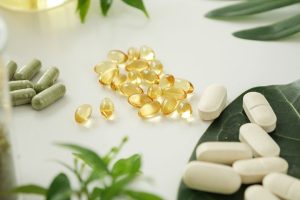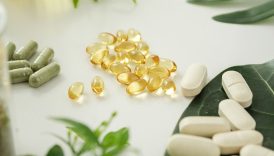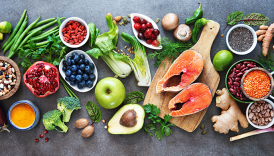Elevate Your Health Routine with Living Good Vitamins: A Must-Have in Your Wellness Arsenal

The Importance of Vitamins in Health
In today’s fast-paced world, the significance of vitamins cannot be overstated. These essential nutrients serve as the body’s building blocks, ensuring everything functions smoothly—from the immune system to muscle health. For example, during the winter months, many people find that they catch colds more frequently. The culprit? Often, a lack of Vitamin C! This vitamin plays a key role in boosting the immune system, making it crucial for maintaining overall health. Vitamins are divided into two categories: water-soluble and fat-soluble. Each type plays distinct roles in the body, highlighting the need for a balanced diet that includes a variety of foods rich in different vitamins.
- Elevate Your Health Routine with Living Good Vitamins: A Must-Have in Your Wellness Arsenal
- The Importance of Vitamins in Health
- How Living Good Vitamins Can Enhance Your Wellness Routine
- Understanding the Benefits of Vitamin C
- Boosting Immune System
- Supporting Collagen Production
- Exploring the Power of Vitamin D
- Regulating Calcium Absorption
- Improving Mood and Mental Health
- The Role of Vitamin E in Skin Health
- Antioxidant Properties
- Protecting Against UV Damage
- Harnessing the Benefits of B Vitamins
- Boosting Energy Levels
- Supporting Brain Function
- Importance of Vitamin A for Vision Health
- Promoting Good Eyesight
- Preventing Night Blindness
- Delving into the Benefits of Vitamin K
- Supporting Blood Clotting
- Maintaining Bone Health
How Living Good Vitamins Can Enhance Your Wellness Routine
Integrating Living Good Vitamins into your daily routine can be a game-changer for your health. By focusing on high-quality vitamin supplements, individuals can effectively bridge nutritional gaps in their diet. Here are some benefits you might enjoy:
- Increased Energy Levels: Essential vitamins can combat fatigue and keep your energy up throughout the day.
- Better Mood Regulation: Certain B vitamins are known to support mental well-being, reducing feelings of stress and anxiety.
- Enhanced Skin Health: Vitamins like E and C can dramatically improve skin texture and appearance.
With a little knowledge and the right supplements, enhancing your wellness routine can be seamless and satisfying!
Understanding the Benefits of Vitamin C
Boosting Immune System
One of the most well-known benefits of Vitamin C is its powerful role in fortifying the immune system. This essential nutrient helps stimulate the production of white blood cells, which are crucial for combating infections. Imagine coming down with a cold and reaching for an orange or a strawberry—there’s a reason for that! When you increase your Vitamin C intake, you’re essentially giving your immune system a boost. Research shows that not only does Vitamin C help reduce the duration of colds, but it also improves overall resilience against various pathogens. Here’s how:
- Increases Antioxidant Defense: Vitamin C is a potent antioxidant, which helps neutralize free radicals.
- Accelerates Wound Healing: Adequate Vitamin C levels ensure that your body heals faster when injured.
Supporting Collagen Production
In addition to its immune benefits, Vitamin C plays a critical role in collagen production, which is essential for skin, tendon, and ligament health. Collagen is essentially the scaffolding that keeps your skin plump and youthful! Consider this: as people age, collagen production naturally declines, leading to wrinkles and sagging skin. By incorporating Vitamin C-rich foods like kiwi, bell peppers, and spinach into your diet, you can help maintain that youthful glow. Key benefits include:
- Enhances Skin Elasticity: Aids in keeping skin firm and elastic.
- Promotes Healing of Skin: Supports the repair of blemishes and scars.
By taking care of your Vitamin C intake, you not only bolster your immune system but also support your skin’s health!
Exploring the Power of Vitamin D
Regulating Calcium Absorption
Shifting focus from Vitamin C to another powerhouse nutrient, Vitamin D holds a crucial role in regulating calcium absorption in the body. Calcium is essential for maintaining strong bones and teeth, and Vitamin D acts as a facilitator, ensuring that this vital mineral is effectively absorbed from the foods you consume. Think about it: many people are unaware that a deficiency in Vitamin D can lead to weakened bones, increasing the risk of conditions like osteoporosis. Here’s how it works:
- Enhances Intestinal Absorption: Vitamin D enables the intestines to absorb calcium more efficiently.
- Maintains Optimal Bone Health: Aids in the mineralization of bone, making them stronger and less prone to fractures.
Improving Mood and Mental Health
Beyond its physical benefits, Vitamin D significantly impacts mood and mental health. Many individuals experience feelings of sadness or fatigue during the winter months when sunlight is scarce, which can lead to a dip in Vitamin D levels. Studies have shown a strong correlation between low Vitamin D levels and an increased risk of depression. To ensure you keep your spirits high, consider these benefits:
- Regulates Serotonin Production: Vitamin D may enhance the production of serotonin, often referred to as the “feel-good” hormone.
- Promotes Cognitive Function: Sufficient Vitamin D can also support brain health, reducing the risk of cognitive decline.
By actively including Vitamin D in your wellness routine—whether through sunlight exposure or supplements—you can foster both physical strength and emotional well-being!
The Role of Vitamin E in Skin Health
Antioxidant Properties
Transitioning from the mental wellness benefits of Vitamin D, let’s dive into another essential nutrient: Vitamin E! Renowned for its role in promoting skin health, Vitamin E serves as a powerful antioxidant, combating oxidative stress caused by free radicals. Picture this: just like you shield your skin from harsh weather, Vitamin E acts as an invisible barrier against environmental stressors. This nutrient not only protects your skin but also enhances its overall appearance. Here’s why it matters:
- Fights Signs of Aging: Vitamin E helps neutralize free radicals that can contribute to fine lines and wrinkles.
- Encourages Skin Healing: It promotes tissue regeneration and is often used in skincare products for its soothing effects.
Protecting Against UV Damage
In addition to its antioxidant properties, Vitamin E plays a vital role in protecting your skin from harmful UV rays. While sunscreen is essential for sun protection, incorporating Vitamin E into your routine can further reinforce your skin’s defenses. Here are a few key benefits:
- Mitigates UV-induced Skin Damage: Vitamin E can help reduce the harmful effects of UV exposure, potentially lowering the risk of sunburn.
- Supports Hydration: It works to maintain skin moisture, keeping it supple and radiant.
With a combination of Vitamin E in your diet and skincare routine, you can effectively safeguard your skin’s health while enhancing its natural beauty!
Harnessing the Benefits of B Vitamins
Boosting Energy Levels
Following our deep dive into the benefits of Vitamin E, it’s time to spotlight a group of vitamins that many overlook—B Vitamins! This family of nutrients plays a pivotal role in energy production and can help you combat fatigue and enhance your vitality. Have you ever noticed that that mid-afternoon slump? Instead of reaching for coffee, opting for foods rich in B vitamins can provide a more sustained energy boost. Here’s how they work:
- Converts Food into Energy: B vitamins, especially B1, B2, B3, and B6, are essential for metabolizing carbohydrates, fats, and proteins into energy.
- Reduces Fatigue: Adequate B Vitamin intake helps prevent feelings of tiredness, allowing you to maintain productivity throughout the day.
Supporting Brain Function
In addition to energizing your body, B vitamins are also fantastic for brain health. Many people may not realize that a deficiency in these vitamins can lead to cognitive decline and memory issues. Consider this: incorporating B12, B6, and folate into your diet can support neurotransmitter function and promote mental clarity. Here are some key benefits:
- Enhances Memory and Concentration: Adequate levels of B vitamins can improve focus and cognitive performance.
- Supports Mood Stability: Certain B vitamins, like B6 and B12, contribute to the production of neurotransmitters that regulate mood and emotions.
By harnessing the benefits of B vitamins, you can experience increased energy and improved brain function, making them indispensable to your overall wellness journey!
Importance of Vitamin A for Vision Health
Promoting Good Eyesight
Transitioning from the brain-boosting benefits of B vitamins, we arrive at another critical nutrient essential for overall health—Vitamin A! Often heralded as the superhero for your eyes, Vitamin A plays a primary role in promoting good eyesight and maintaining optimal vision. Imagine being in a dimly lit restaurant and struggling to read the menu. This isn’t just inconvenient; it could be a sign of insufficient Vitamin A in your diet. This nutrient is fundamental for producing rhodopsin, a protein in the retina that helps the eyes adapt to low light. Here are a few key ways Vitamin A supports vision:
- Enhances Visual Acuity: Vitamin A helps maintain a clear cornea, which is vital for optimal vision.
- Protects Against Degeneration: Adequate intake can reduce the risk of age-related macular degeneration (AMD).
Preventing Night Blindness
One of the lesser-known benefits of Vitamin A is its ability to help prevent night blindness. This condition can severely impact your ability to see in low light, complicating everyday activities like driving at night.
- Supports Eye Function: Vitamin A helps the eyes interpret light signals, crucial for seeing in dim conditions.
- Reduces Risk of Compromised Vision: Ensuring optimal levels of Vitamin A can protect against vision deterioration over time.
By prioritizing Vitamin A in your nutrition—think carrots, sweet potatoes, and leafy greens—you can defend against night blindness and promote lasting eye health!
Delving into the Benefits of Vitamin K
Supporting Blood Clotting
As we transition from the vision-enhancing qualities of Vitamin A, let’s shine a light on a vital nutrient: Vitamin K! Often overshadowed by its popular counterparts, Vitamin K plays an essential role in blood clotting—a function crucial for preventing excessive bleeding when injuries occur. Imagine a minor cut from your kitchen endeavor; without sufficient Vitamin K, healing would be slower and riskier. This vitamin helps synthesize proteins necessary for blood coagulation, meaning your body can efficiently stop bleeding. Here are some important points about how Vitamin K supports blood clotting:
- Promotes Protein Formation: It is essential for the production of clotting factors, including prothrombin.
- Prevents Unnecessary Bleeding: Adequate levels ensure that your body responds appropriately to injuries.
Maintaining Bone Health
Moreover, Vitamin K doesn’t stop at blood health—it also plays a significant role in maintaining bone health. It collaborates with Vitamin D to ensure effective calcium utilization in the bones, which is key for maintaining their strength. Consider this: individuals with low Vitamin K levels may have an increased risk of fractures and osteoporosis. Key benefits include:
- Strengthens Bone Density: Vitamin K assists in binding calcium to the bone matrix, fortifying bones.
- Reduces Fracture Risk: Sufficient Vitamin K intake can significantly decrease the likelihood of bone fractures.
Incorporating Vitamin K-rich foods like leafy greens, broccoli, and fermented foods into your diet can greatly enhance your blood and bone health, rounding out your nutritional regimen beautifully!





